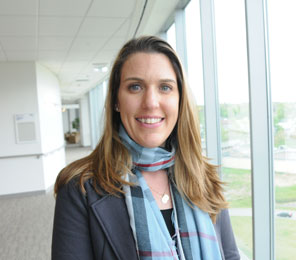In search of . . . helping elders manage chronic diseases: Jane Saczynski, PhD
On Tuesdays, the Daily Voice features a first-person narrative from a researcher explaining the science behind a recent grant, and the inspiration or impetus behind becoming a scientist at UMass Medical School. If you know of a researcher you’d like to see profiled, send an email to UMassChanCommunications@umassmed.edu.
|
Jane Saczynski, PhD, assistant professor of medicine in the Division of Geriatric Medicine, talks about her research into optimizing aging patients’ self-management of chronic disease , including her current National Heart, Lung and Blood Institute grant, Psychosocial Factors and Rehospitalization after Acute Myocardial Infarction. (one year, $287,875; recommended for one additional year, $164,500) |
 |
My research focuses on cognitive status and the self-management of chronic disease, particularly cardiovascular disease, in middle-aged and older patients. Many patients with cardiovascular diseases, such as heart failure, are cognitively impaired. Patients with cognitive impairment have poorer clinical outcomes, including increased rates of hospitalization, but why is not well understood. My work examines how cognitive impairment impacts a patient’s ability to engage in effective self-management, such as adhering to a special diet or complex medication regimen. I also study the role caregivers play in self-management of disease in cognitively impaired patients.
The new grant is an ancillary study to TRACE-CORE (Transitions, Risks and Actions in Coronary Events--Center for Outcomes Research and Education), a large, ongoing cohort study being conducted at UMMS under principal investigator Catarina Kiefe, MD, PhD, chair and professor of quantitative health sciences. My ancillary study to TRACE-CORE has two main goals: to examine changes in cognitive status within one month following hospital discharge, and to describe the amount and type of care-giving assistance patients receive after discharge.
Although many patients are cognitively impaired during a hospital stay, many “recover” their cognitive abilities soon after returning home, although the proportion who recover and when they recover are not well understood. We are assessing cognitive function during hospitalization at one week and one month after discharge in order to gain an understanding of how many people improve, the extent to which they improve and when the improvements occur. We are also interviewing informal (i.e., family) caregivers a month after discharge and asking them questions about the specific activities they are helping with. These include household activities such as cleaning, shopping and money management, or disease-specific activities such as medication management or support of behavioral changes necessary after a coronary event, and how this role has impacted them with respect to stress, depression and burden. Although well described and understood in other diseases, such as dementia and cancer, the role of the caregiver is not well understood in coronary disease.
The results of this study will help us design discharge education programs that may need to be tailored to the cognitive status of the patient, including when and how to include informal (family) caregivers in these programs, or may need to be reinforced soon after discharge in patients who were cognitively impaired at discharge bu